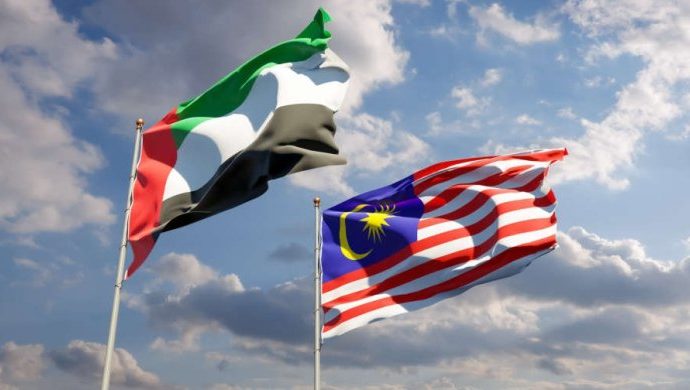Abu Dhabi Monitoring Desk
The Comprehensive Economic Partnership Agreement (CEPA) between the United Arab Emirates (UAE) and Malaysia has officially come into force, representing a significant step forward in trade and investment relations between the two nations.
According to UAE’s state news agency WAM, the landmark agreement was signed in January 2025 and establishes a robust framework for economic cooperation across multiple sectors.
Bilateral trade is expected to more than double from $5.5 billion in 2024.
The two countries have set a target to increase non-oil trade to $13.5 billion by 2032.
In the first half of 2025, trade volume reached $3.3 billion, reflecting a 30.9% increase compared to the same period last year.
The UAE-Malaysia CEPA includes key measures such as:
- Reduction or elimination of tariffs
- Simplified customs procedures
- Enhanced collaboration between private sectors
These steps are designed to strengthen economic ties and accelerate mutual market access
UAE Minister of State for Foreign Trade, Dr. Thani bin Ahmed Al Zeyoudi, hailed the agreement as a milestone in bilateral relations. He noted that CEPA will not only enhance trade but also unlock new investment opportunities in critical sectors such as:
- Healthcare
- Artificial Intelligence
- Renewable Energy
- Logistics
“This agreement represents a strategic advancement in our bilateral ties and opens the door to deeper collaboration in future-driven industries,” said Dr. Al Zeyoudi.
This is Malaysia’s first trade agreement with a Gulf Cooperation Council (GCC) country, marking a significant step in expanding its economic ties with the Arab world.
The agreement also includes a dedicated chapter on the Islamic economy, and emphasizes:
- Sustainable development
- Technology transfer
- Private sector engagement
The UAE’s CEPA program is a core pillar of its foreign trade strategy, aiming to:
- Reach $1 trillion in total trade by 2031
- Grow the UAE economy to over $800 billion
Since its launch in September 2021, the CEPA program has secured 31 trade agreements, giving Emirati businesses access to markets representing one-quarter of the world’s population.
As the UAE-Malaysia CEPA comes into effect, both nations are poised to deepen economic integration, promote sustainable growth, and strengthen their positions as regional and global trade hubs.


